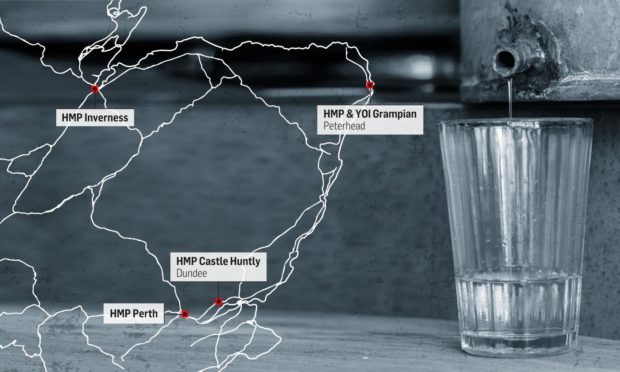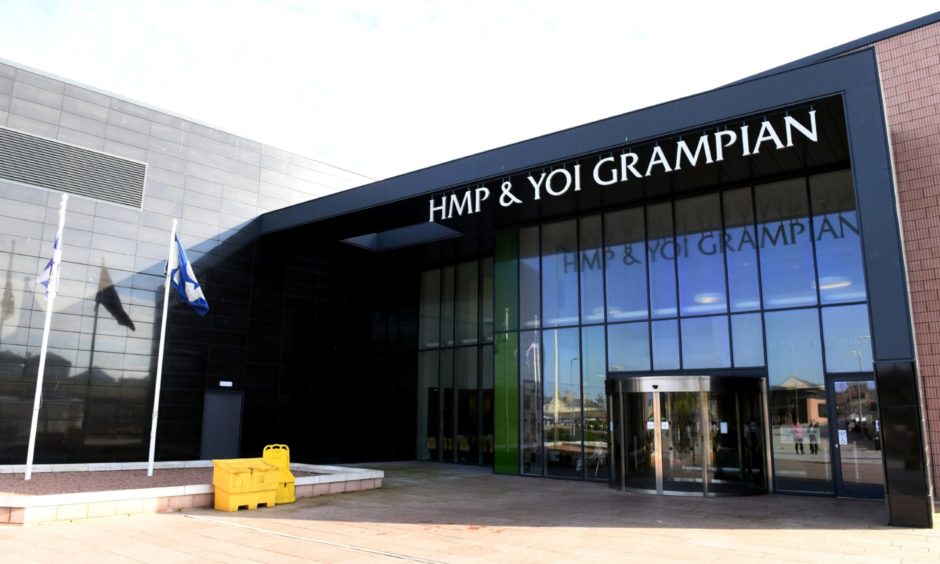Prisoners have been hitting the homemade hooch in HMP Grampian, Perth, Castle Huntly and Inverness prisons during the pandemic, we can reveal today.
Our probe revealed that HMP Grampian was one of the thirstiest jails with alcohol seizures soaring from just six in 2019 to 31 the following year and 14 already this year.
We discovered that booze raids targeting illicit stills in all Scottish jails have trebled during lockdown sparking calls by politicians for a full investigation.
Prison chiefs have struck a blow against inmate boozers after more than 250 stashes of moonshine were seized last year – more than three times the number of seizures in 2019.
The data revealed that there were 82 booze swoops in Scottish jails in 2019 with the number of seizures soaring to 251 in 2020. This year, there have already been 105 booze raids as inmates continue to hit the bottle.
In Perth prison, only one illicit still was spotted in 2019 with nine seizures the following year and six already so far in 2021. There were four booze raids in Inverness jail in 2019 and seven the following year. Two seizures of alcohol were made at Castle Huntly open prison, near Dundee, over the same period.
Prison officials were unable to provide figures for the volume of alcohol seized. The worst offender was Shotts Prison, North Lanarkshire, where homemade alcohol was confiscated 111 times during the period.
‘We need answers’
Scottish Labour justice spokeswoman Pauline McNeill said: “We need to tackle the scourge of alcohol abuse and illicit brewing in our prisons.
“Prison staff should not have to deal with drunken prisoners and prisoners should be kept safe from potentially dangerous illicit alcohol.
“We also need answers over how prisoners are able to get their hands on the raw materials and equipment to allow them to create alcohol.
“Every effort must be made to support staff in their duties and to keep prisoners safe.”
Prisoners have been known to make alcohol in their cells by fermenting large amounts of sugary fruit obtained from the canteen or prison shop. Yeast is added using bread or already rotten fruit before the mixture is placed by a heat source such as a radiator or kettle for several days. A strong, wine-like drink is produced.
An increase in prison alcohol seizures in other countries has been blamed on several factors relating to the coronavirus lockdown.
The cancellation of court sittings meant prison officers who would typically be assigned to escort duty were available to search for contraband. And strict movement restrictions meant prisoners spent more time in their cells, leading to increased boredom.
The news comes after the HMP Grampian superjail hit the headlines when prisoners had to be protected from dive-bombing gulls.
Jail chiefs spent almost £250,000 on a roof net to protect lags and staff from the aggressive gulls. But despite the huge outlay the birds were not put off with some taking to perching on the covering at the Peterhead prison.
Previous pest control measures at the site — a mile from Europe’s biggest fishing port — cost about £2,000 a year according to 2020 figures, a fraction of the price of the net. The Scottish Prison Service defended the £234,000 net spend, insisting the birds posed “a danger to staff and prisoners”.
‘Alcohol addiction is one of the key factors driving crime’
Scottish Greens justice spokeswoman Maggie Chapman vowed to raise the problem with prison chiefs as a matter of urgency.
She said: “These figures reveal some of the challenges faced when we send people to prison when treatment and support would be more appropriate.
“Alcohol addiction is one of the key factors driving crime, and we should take every step we can to avoid unnecessary prison sentences for those whose problems include alcohol abuse. At a time when prisons are in crisis, it is no surprise that untreated alcoholism leads to these sorts of figures.
If we are serious about protecting people from crime, we must start with treating the very treatable underlying causes of crime – of which alcohol is a primary one.”
Maggie Chapman
“And during a pandemic, when many prisoners have been isolated for long periods and denied visitors, the increase in homemade alcohol use could probably have been predicted.
“If we are serious about protecting people from crime, we must start with treating the very treatable underlying causes of crime – of which alcohol is a primary one. And for those who are in our prisons, the process of rehabilitation must include the provision of appropriate mental health support and support to tackle addiction.
“I will follow up with the Scottish Prison Service to establish what course of action is followed after seizures of homemade alcohol take place.”
An SPS spokeswoman said: “We recognise the importance of providing a safe and secure environment for all those living and working in our prisons.”
Any prohibited items being recovered can be attributed to the professionalism and diligence of our staff and partners, advances in technology and the deployment of various methods of detection.
“Anyone found in possession of contraband or attempting to introduce such items into our prisons is reported to the appropriate authorities.”


